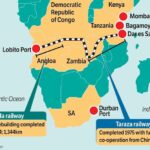President Donald Trump’s foreign policy strategy has been characterized by a strategic blend of assertiveness and unpredictability, also known as the “madman theory.” This strategy entails keeping rivals guessing about the United States’ upcoming movements, so gaining advantage in diplomatic negotiations. The nomination of hawkish members to his cabinet is a significant component of this strategy, indicating a willingness to pursue strong, forceful foreign policy.
The Role of a Hawkish Cabinet in Trump’s Foreign Policy
Trump’s choice of individuals, who are renowned for their harsh viewpoints, such as Senator Marco Rubio as Secretary of State and Representative Mike Waltz as National Security Adviser, demonstrates his penchant for a strong foreign policy. The appointments reflect a strategy that utilizes the reputations and viewpoints of hawkish officials to convey strength and determination internationally. Rubio’s firm stance on China and Waltz’s military background align with Trump’s objectives to confront adversaries with a united and formidable front.
Rubio’s hard attitude toward China, which advocates for human rights and democracy, particularly in Hong Kong and the Uyghur minority, signals a more combative US approach toward Beijing. His backing for Taiwan and projected increases in military sales point to a probable escalation in US-China ties.
Waltz has 27 years of experience in the United States Army and National Guard, with combat tours in Afghanistan, the Middle East, and Africa. His time in Congress has been defined by an emphasis on defence and foreign affairs, with positions on the House Armed Services Committee and the House China Task Force. He has expressed strong criticism of China’s global ambitions, emphasizing the need for heightened military preparedness and a firm response to perceived threats from Beijing. This assertive position corresponds with Trump’s “America First” doctrine, highlighting the necessity to address adversaries with determination and fortitude.
Similarly, Pete Hegseth’s appointment as Secretary of Defence matches this trend. Hegseth has questioned the extent of American military participation abroad, particularly in Ukraine, and has attacked both the Biden administration and its NATO allies. His views reflect a probable shift in US strategy toward a more limited military engagement, focused on national interests rather than international responsibilities.
Madman Theory in Practice
The “madman theory,” which was initially linked to President Richard Nixon, entails the development of an image of unpredictability in order to maintain adversaries’ uncertainty. This strategy has been implemented by Trump through the use of provocative statements and threats, which have compelled other nations to contemplate the possibility of extreme measures. The objective of this method is to leverage the ambiguity it generates in order to secure concessions and favourable terms during negotiations. or example, Trump’s unpredictable language toward North Korea was designed to put pressure on Pyongyang to engage in disarmament discussions.
Balancing Assertiveness with Aversion to War
Striking a harmonious balance between confidence and a reluctance towards conflict
In light of the assertive nature of his cabinet and the bold stance taken, Trump has shown a notable hesitance to involve the United States in new extensive military engagements. His government has preferred economic sanctions, diplomatic pressure, and strategic threats to actual military engagement. This approach reflects a desire to promote US interests and project strength without incurring the costs and uncertainties involved with long-term military operations. For example, instead of launching direct military action against Iran, the Trump administration imposed strict sanctions and engaged in a maximal pressure campaign.
Implications for International Relations and American Exceptionalism
Trump’s reliance on a hawkish cabinet and the Madman theory have serious consequences for foreign relations. While this strategy seeks to maximize US leverage, it risks alienating allies and exacerbating international differences. Allies may see the unpredictability and aggressive methods as disruptive, resulting in damaged relationships and limited cooperation. Furthermore, as countries like as China and Russia reinforce their power through autonomous alliances, Trump’s insular strategy may limit America’s ability to form or strengthen global coalitions. This move could signal a shift away from the age of American exceptionalism, which was defined by moral and ideological leadership, and toward a more typical great-power rivalry, thereby undermining the United States’ global standing.
Conclusion
Trump’s foreign policy stance, which includes a hardline cabinet and a focus on transactional and coercive measures, seeks to maximize the United States’ worldwide leverage. However, this tactic runs the danger of losing friends and aggravating existing international divisions. His efforts to destabilize established systems may face opposition, since authoritarian leaders and rival nations have become proficient at exploiting his (un)predictable techniques.
While his emphasis on economic sanctions, military threats, and ‘unpredictable’ diplomatic manoeuvres is intended to assert US influence, it may undermine the country’s ability to maintain strong alliances and foster collaborative coalitions, eventually weakening its global leadership in favour of competitive great-power dynamics.
By: GEOPOLIST Editorial Team







